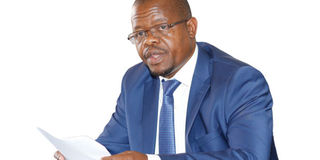Magogo ready to undress to push sports agenda

Vision. Magogo intends to champion sports agenda in Parliament. PHOTO | FILE
What you need to know:
- A cause. The Fufa boss has for long advocated for fundamental changes in the sports sector; he intends to create a Sports Caucus to front that agenda.
Fufa president Moses Magogo has pledged to not be like other sportspersons who forget the sector once in Parliament.
The Budiope East MP-elect has vowed to undress if that is what it will need to successfully advocate for sports agenda in Parliament.
Appearing on Fufa 102.1 FM to set out the sports agenda, last week, Magogo used the global sports economy – which is about $700b or the size Uganda’s annual budget for over 100 years – to draw into the significance of the sub-sector.
“One uneducated Ugandan in the English Premier League would pay over 100 university professors,” he said.
Uganda is indeed endowed with raw sports talent across the disciplines and has produced many self-made winners.
“The annual average earning of a footballer in the Premier League is about $3.6m, and the Cranes have beaten nations with 100 top professionals in Europe, so it is not farfetched for Uganda to export 50 football players to the top five European leagues, which would translate into over $200m per annum,” he said.
The potential of sports labour and sports tourism is something Magogo intends to interest government to harness.
Statistics
Magogo said the Budget Allocation table has no sports statistics nor correct perception, which is a multi-sector activity encompassing health, education, social development, tourism and trade.
Sports, he noted, is under the Education Sector, thus receiving just 0.13 percent of the National Budget for 2019/20 appropriation, for instance.
“This low national priority order is informed by the mind-set of defining sport as a recreational activity. Sport is a big-time economic game changer,” he said.
Magogo intends to push for the funding for all teams and athletes representing Uganda in international competitions.
“A national athlete should be identified at the right age from the remotest village and nurtured using the right technical personnel, techniques and equipment,” the Fufa supremo said.
Infrastructure
Magogo said it is ironical that during the era of amateur sport, Uganda had better infrastructure than it has today.
“What happened to Nakivubo, Lugogo, Bugembe, Kakyeka, Barifa, Mbale, and the over Boma grounds in the country?” he asked. “Namboole, the only international stadium we have, is not only out of use to sports activities but also in a dire straits.”
He challenged leaders to push for sports infrastructure development, saying the government has commissioned new markets in almost every city and town, but not a single stadium.
Magogo said the 1964 Sports Act is “archaic, obsolete and dangerous,” saying it must be replaced with a law that addresses modern sports challenges.
He said for the sports industry to grow, there must be investment and policies. “To protect manufacturers, the government imposes a tax on imports, but sport is left to directly compete with foreign content,” he said.
The concerns are valid considering that pay TVs, telecoms and betting firms earn obscene profits from the limping local sports economy but there are no policies to ensure they reinvest in local sports sector.
“Where is the 70 percent local content policy on TV aggregates for sports? How can UBC, run on the taxpayers’ money, be showing the English Premier League but can’t invest in local sport?” he asked.
“We’re creating the Sports Caucus in the 11th Parliament and we’ll use all means to lobby. If it means undressing, I’ll do so, now not tomorrow.”




